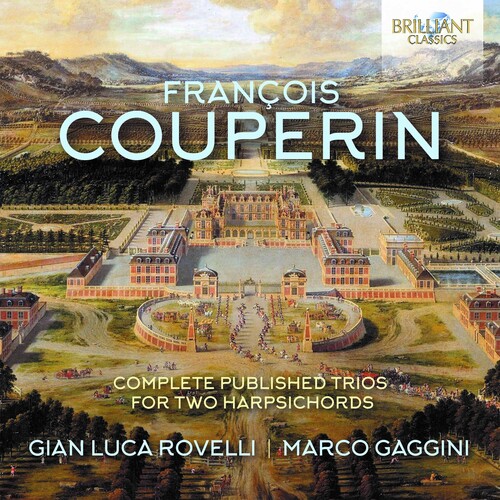Show results for
Deals
- 4K Ultra HD Sale
- 50s Films Sale
- Action Sale
- Alternative Rock Sale
- Anime sale
- Award Winners Sale
- Bear Family Sale
- Blu ray Sale
- Blues on Sale
- British Sale
- Christmas in July
- Classical Music Sale
- Comedy Music Sale
- Comedy Sale
- Country Sale
- Criterion Sale
- Electronic Music sale
- Folk Music Sale
- Horror Sci fi Sale
- Kids and Family Sale
- Metal Sale
- Music Video Sale
- Musicals on Sale
- Mystery Sale
- Naxos Label Sale
- Page to Screen Sale
- Paramount Sale
- Rap and Hip Hop Sale
- Reggae Sale
- Rock
- Rock and Pop Sale
- Rock Legends
- Soul Music Sale
- TV Sale
- Vinyl on Sale
- War Films and Westerns on Sale

Complete Published Trios
- (2 Pack)
- Format: CD
- Release Date: 12/6/2019

Complete Published Trios
- (2 Pack)
- Format: CD
- Release Date: 12/6/2019
- Label: Brilliant Classics
- Number of Discs: 2
- UPC: 5028421957524
- Item #: 2231526X
- Genre: Classical
- Release Date: 12/6/2019

Product Notes
François Couperin (1689-1755) 'Couperin le Grand' was a master of the Baroque era, and this release offers us a fresh recording his chef-d'oeuvres: the harpsichord trios. Couperin was born into a musical family. He followed in his father's footsteps as organist at the Saint-Gervais Church in Paris, and before long his musical talent led him to the court of King Louis XIV. His appointment as court musician introduced him to a network of composers, with whom he regularly corresponded and shared ideas. Johann Sebastian Bach, for example, greatly admired his volumes of harpsichord music. L'Apothéose de Lully and L'Apothéose de Corelli open this set and are among the earliest examples of programme music. The former is dedicated to Jean-Baptiste Lully (1632-1687) who had defined the sound of French Baroque music, while L'Apothéose de Corelli pays homage to the Italian virtuoso, Antonio Corelli (1653-1713). The pieces depict the esteemed composers reaching the summit of Mount Parnassus. Then, guided by the God Apollo, they merge the French and Italian styles. Relations between Italy and France had soured following the Spanish War of Succession and the scramble to claim new territory, but Couperin's piece favors integration over individualism, as each composer's style compliments the other, raising the music to divine greatness. Les Nations follows in this vein, as it draws influence from both styles, featuring Corelli-inspired forms with alternating slow and quick tempos as opposed to the French-style suites of dances. It was dedicated to France, Spain, the German Empire and to Piedmont, part of the newly reformed Kingdom of Sardinia. In the wider context, Couperin's music is tinged with political ideology as he paints a picture of harmony flourishing from European unity. Couperin's pioneering music has inspired composers for generations; a century after his death, Johannes Brahms was programming Couperin's keyboard works on his concerts, and Maurice Ravel paid homage to the composer in Le tombeau de Couperin.

